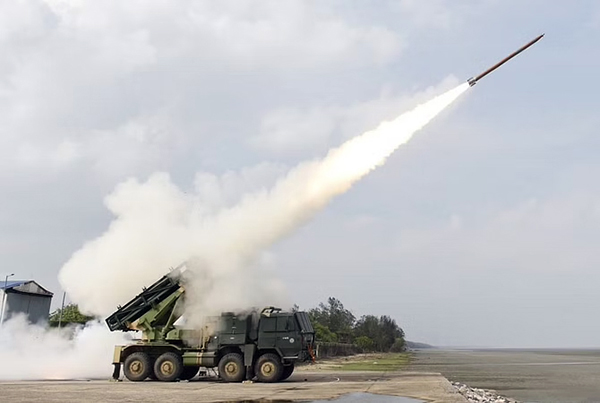

Armenia has signed a contract with India for procuring the indigenous Pinaka multi-barrel rocket launchers, unspecified missiles and ammunition, amid its growing tensions with Azerbaijan which is close to Turkey and Pakistan.
On Wednesday, Armenia and Azerbaijan accused each other of violating a cease-fire agreement that ended two days of conflict this month.
Sources in the defence and security establishment confirmed that the government-to-government contract, valued at about Rs 2,000 crore, was signed earlier this month and that the supplies would be fast tracked as per the requirement.
While the exact quantity is not known, the order includes the indigenous Pinaka system, ammunition and anti-tank rockets.
This is the first international order for the system, which was developed by the Defence Research and Development organisation (DRDO). The multiple rocket launcher is already in service with the Army and has been deployed along the borders with China and Pakistan.
The defence sources remained tight-lipped about the exact nature of the government-to-government contract but pointed out that Armenia has bought Indian defence goods in the past.
The ex-Soviet republic had bought four indigenous Swathi weapons locating radar in 2020 from India which was delivered in the backdrop of its conflict with Azerbaijan.
Azerbaijan-Turkey-Pakistan axis
Azerbaijan is seen by many as part of an emerging axis with Turkey and Pakistan. It has used Turkish drones to fight war against Armenia, and is also in talks with Pakistan to buy the JF-17 fighter aircraft.
Observers have pointed out that in recent years, despite their physical distance, an “indirect linkage” has emerged between Armenia-Azerbaijan and India-Pakistan.
In 2017, Turkey, Azerbaijan, and Pakistan had signed a Trilateral Ministers Agreement that established security cooperation, and built upon previous bilateral military aid arrangements.
Besides the strategic importance of the deal with Armenia, the export order is a boost for the indigenous defence industry with the Indian government keen to increase the value of Indian arms exports.
India’s defence exports touched a record Rs 13,000 crore in the 2021-2022 fiscal, “eight times” of what it was around five years ago.
In 2020, the Narendra Modi government had set a target of Rs 35,000 crore ($ 5 billion) export in aerospace, and defence goods and services in the next five years. This is part of the turnover of Rs 1.75 lakh crore ($ 25 billion) in defence manufacturing by 2025 that the government is aiming to achieve.
In January, India had signed a contract with the Philippines for the sale of BrahMos missiles.
Currently, India exports defence equipment to 75 countries and this includes weapon simulators, tear gas launcher, torpedo loading mechanism, alarm monitoring & control, night vision monocular & binocular, light-weight torpedo & fire control systems, armoured protection vehicle, weapons locating radar, high-frequency radio, coastal surveillance radar among others.
















